Since the fall of 2021, Advance CTE’s Opportunity Gap Analysis (OGA) workshop has provided training, resources, and support to help state leaders identify and address gaps in access to high-quality Career Technical Education (CTE). While high-quality CTE programs of study across the country are providing opportunities for learners to follow their passion, achieve career goals, and ensure future economic success, the reality is that not all learners have access to these programs. In this blog series, Senior Policy Associate Jessi Maddox interviews previous participants of the OGA workshop to share the impact and the lessons learned from implementing the training in their state.
The reauthorization of the Carl D. Perkins Career and Technical Education Act (Perkins V) on July 31, 2018, elevated the importance of equal access to CTE programs and connected experiences for all learners and has challenged states and local recipients to prioritize this work to address identified gaps. Over the past three years, Advance CTE has led in-depth gap analysis training with 39 state teams. These teams have further disseminated the gap analysis process within their state CTE systems, resulting in changes in policies and practices that bring identifying and addressing gaps to the forefront of their CTE programs.
With the launch of the newest cohort of the Opportunity Gap Analysis workshop this past May (2024), we wanted to connect with prior participants and ask about the impact the gap analysis training has had on equal access to CTE programs within their state. This month we are spotlighting the Bureau of Community Colleges and Postsecondary Readiness with the Iowa Department of Education and the work their team has done since the culmination of their cohort in Fall 2022.
Iowa’s participation in the workshop has increased collaboration of CTE professionals at the state and local level, created more connected data systems within the state, and facilitated a data-oriented approach to closing access gaps in their CTE programs.
Tell us about yourself and your CTE background.
The Iowa Department of Education CTE Education Program Consultants collaborate in the areas of access, equity, accountability, monitoring, and compliance to administer Perkins V at the secondary and postsecondary levels. CTE consultants, coordinators, and administrators (both internal and external stakeholders) have varying levels of experience in CTE program administration across all levels of CTE, such as secondary, postsecondary, state-level management, and local-level management.
When did your state participate in the Opportunity Gap Analysis Workshop?
In June 2022 with a team that consisted of the State CTE Director, Methods of Administration (MOA) Coordinator, data personnel, and an education consultant.
What in-state training(s) has your team facilitated using the Opportunity Gap Workshop model and/or related resources?
The state team has led six trainings (virtual and face-to-face) targeting local-level CTE faculty and administrators over the last two years. These training sessions have focused on serving students with disabilities in CTE to understand the number of local programs where a student population may be under- or over-represented.
Describe how your team’s participation in the Opportunity Gap Analysis training impacted CTE in general within your state.
The training allowed stakeholders to focus on a particular subset of students to identify access barriers to CTE programming. Utilizing a collaborative approach with multiple state agencies serving students with disabilities (SWD), we developed a process of identifying enrollment, participation, and completion patterns for SWD with the construction of data dashboards focusing on students with an Individualized Education Program (IEP). The dashboards are a work in progress with the goal to include all special population subgroups. This tool has proved invaluable for school districts to develop inclusive and targeted improvement plans.
Describe how the Opportunity Gap Analysis training specifically led to changes in your state’s data policies and procedures.
At the district level, input from stakeholders including CTE teachers, administrators, and counselors regarding the low number of CTE concentrators provided insight into procedures, policies, or practice that needed change in order to address systemic barriers preventing full engagement for students.
The data dashboards and the accompanying training resources allowed for increased collaboration with internal Department data staff and with outside agencies. For example, to better track the educational and training experiences of youth experiencing homelessness and youth in foster care, the Department entered into data-sharing agreements with other state agencies that also serve these students. This will allow for better outreach and connections with community-based organizations and workforce development to reach disconnected youth at the secondary level as well as older students and young adults aging out of the foster system.
In addition to setting up long-term data-sharing agreements, CTE data consultants and the Iowa Department of Health and Human Services also took short-term steps to better serve learners in foster care through one-time data pulls that match foster care records with community college enrollment records.
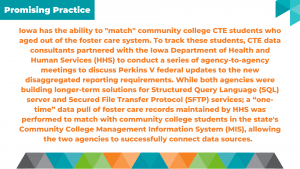
Please describe any steps that have been taken to improve access for CTE learners after going through the CTE opportunity gap analysis process:
Perkins applications for fiscal year 2025 reflect the use of OGA training resources in the development of recipients’ bi-annual Comprehensive Local Needs Assessment (CLNA) plans/priorities in serving special population students in CTE. These applications reflect specific language and recommendations from the training in several areas.
A sampling of activities mentioned in District applications included
1) data-driven decision making;
2) incorporating CTE engagement in the development of IEPs;
3) career counseling and support services;
4) increasing Career Technical Student Organization (CTSO) and work-based learning opportunities;
5) outreach and recruitment; and
6) supporting inclusive learning environments in CTE classrooms.
What lessons learned, or outcomes, from your workshop and facilitation experiences would you most like to share with states considering participating in an Opportunity Gap Analysis cohort?
Collaboration is key in addressing inequities in CTE. Our experience from the state level is that it is necessary to work across divisions internally and to streamline quantitative and qualitative data collection and analysis processes across agencies and educational levels. This will assist in the evaluation of existing procedures and practices in CTE program delivery to facilitate a change-oriented approach in the program improvement process in our efforts to better serve all students in CTE.
Bring the Opportunity Gap Analysis to Your State
If your organization is interested in learning more about what it takes to conduct a gap analysis in your state, or other opportunities to engage with Advance CTE’s suite of resources addressing methods to close access gaps, fill out the Technical Assistance Interest Form for personalized options that can help both staff and learners succeed.
Join us at Advance CTE’s upcoming Fall Meeting in Phoenix, AZ on October 21-23, 2024. During this three-day convening, there will be specific sessions dedicated to OGA and upcoming enhanced versions of the original workshop. These new iterations of the workshop will focus on state-requested program areas like work-based learning, apprenticeship, and credentials of value. We hope to see you in the Grand Canyon state!
 Tracking and analyzing data are key to any successful Career Technical Education (CTE) program. CTE leaders use everything from pen and paper to full-scale data management systems to record this essential information.
Tracking and analyzing data are key to any successful Career Technical Education (CTE) program. CTE leaders use everything from pen and paper to full-scale data management systems to record this essential information. 


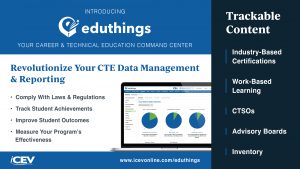
 I completed my undergraduate degree in political science from the University of Nevada, Las Vegas and participated in a public policy minor program in collaboration with the Washington, DC-based Brookings Institution. Through the program, I worked on policy advocacy and research relevant to the Mountain West region at my university’s think-tank, specifically in education policy. After interning at the Brown Center on Education Policy, I was confident that educational research and its impact on learner outcomes was the space I wanted to be in for years to come.
I completed my undergraduate degree in political science from the University of Nevada, Las Vegas and participated in a public policy minor program in collaboration with the Washington, DC-based Brookings Institution. Through the program, I worked on policy advocacy and research relevant to the Mountain West region at my university’s think-tank, specifically in education policy. After interning at the Brown Center on Education Policy, I was confident that educational research and its impact on learner outcomes was the space I wanted to be in for years to come. 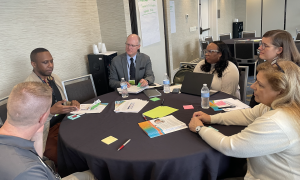
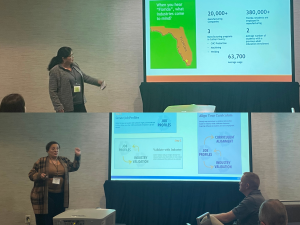
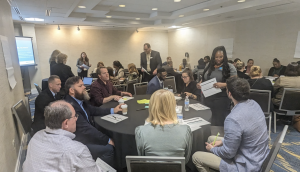
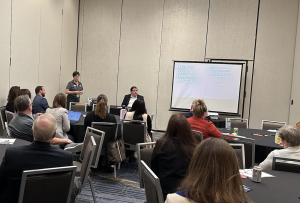
 Dr. Crystal Gardner currently serves as the Instructional Supervisor for the Houston Community College (HCC) Alternative Teacher Certification Program (ATCP). In this role, she oversees instructional operations, program development, quality control, and compliance management. Joining the Fellowship was an exciting opportunity to fully immerse herself in the world of career and technical education (CTE) through equity-aligned learning and real-world practicum.
Dr. Crystal Gardner currently serves as the Instructional Supervisor for the Houston Community College (HCC) Alternative Teacher Certification Program (ATCP). In this role, she oversees instructional operations, program development, quality control, and compliance management. Joining the Fellowship was an exciting opportunity to fully immerse herself in the world of career and technical education (CTE) through equity-aligned learning and real-world practicum. “As a lifelong learner, I’ve always been intentional in my pursuit of professional development and growth in my career.”
“As a lifelong learner, I’ve always been intentional in my pursuit of professional development and growth in my career.”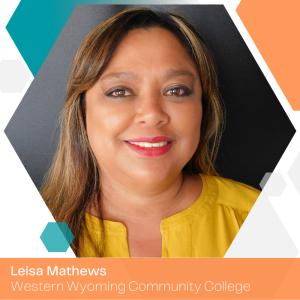 Tell us about your journey to the Fellowship.
Tell us about your journey to the Fellowship.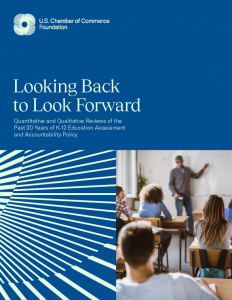 Earlier this year, the U.S. Chamber of Commerce Foundation hosted a webinar to release their new report,
Earlier this year, the U.S. Chamber of Commerce Foundation hosted a webinar to release their new report,